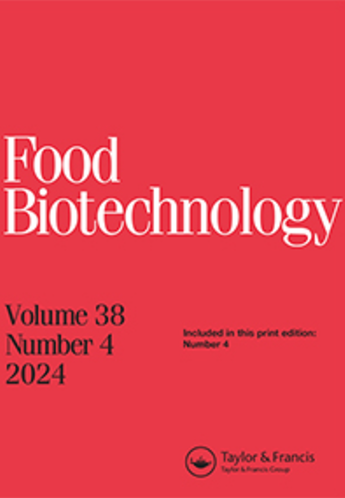枯草芽孢杆菌发酵大豆提取物对小鼠的免疫调节作用
IF 1.6
4区 农林科学
Q4 BIOTECHNOLOGY & APPLIED MICROBIOLOGY
引用次数: 0
摘要
摘要本研究探讨发酵大豆提取物(FSE)对RAW264.7细胞和BALB/c小鼠的潜在免疫调节作用。在存在或不存在FSE的情况下,测量LPS刺激RAW264.7细胞中促炎细胞因子的表达。小鼠分别口服125、250和500 mg/kg FSE 21 d,分析其免疫应答。在RAW264.7细胞中,FSE显著降低了促炎细胞因子的表达。体内实验显示脾细胞增殖明显升高;中性粒细胞迁移;吞噬活动;CD18+、CD4+和CD8+ T细胞的表达;IL-2、IL-4和IFN-γ的表达。用GC-MS和LC-MS /MS对FSE中的主要化合物进行了鉴定。分子对接分析表明,大豆苷元、染料木素和大豆苷元可能与人高亲和力的fc - γ - ri - igg复合物结合,参与免疫应答。综上所述,FSE可作为增强免疫调节能力的保健功能食品的候选成分。本文章由计算机程序翻译,如有差异,请以英文原文为准。
Immunomodulatory effects of Bacillus subtilis-fermented soybean extract in mice
ABSTRACT This study investigated the potential immunomodulatory effects of fermented soybean extract (FSE) in RAW264.7 cells and BALB/c mice. The expression of proinflammatory cytokines in RAW264.7 cells was measured after LPS stimulation in the presence or absence of FSE. Mice were orally administered 125, 250, and 500 mg/kg FSE for 21 days, and their immune response was analyzed. In RAW264.7 cells, FSE significantly reduced the expression of proinflammatory cytokines. In vivo experiments revealed significantly elevated splenocyte proliferation; neutrophil migration; phagocytic activities; expression of CD18+, CD4+, and CD8+ T cells; and expression of IL-2, IL-4, and IFN-γ. The major compounds in FSE were identified by GC–MS and by LC–MS/MS. Molecular docking analysis showed that daidzin, genistin and daidzein could potentially bind to the human high-affinity FcγRI–IgG complex to be involved in immunological responses. Taken together, FSE can be a candidate ingredient for health functional food with enhanced immunomodulating ability.
求助全文
通过发布文献求助,成功后即可免费获取论文全文。
去求助
来源期刊

Food Biotechnology
工程技术-生物工程与应用微生物
CiteScore
3.80
自引率
0.00%
发文量
15
审稿时长
>12 weeks
期刊介绍:
Food Biotechnology is an international, peer-reviewed journal that is focused on current and emerging developments and applications of modern genetics, enzymatic, metabolic and systems-based biochemical processes in food and food-related biological systems. The goal is to help produce and improve foods, food ingredients, and functional foods at the processing stage and beyond agricultural production.
Other areas of strong interest are microbial and fermentation-based metabolic processing to improve foods, food microbiomes for health, metabolic basis for food ingredients with health benefits, molecular and metabolic approaches to functional foods, and biochemical processes for food waste remediation. In addition, articles addressing the topics of modern molecular, metabolic and biochemical approaches to improving food safety and quality are also published.
Researchers in agriculture, food science and nutrition, including food and biotechnology consultants around the world will benefit from the research published in Food Biotechnology. The published research and reviews can be utilized to further educational and research programs and may also be applied to food quality and value added processing challenges, which are continuously evolving and expanding based upon the peer reviewed research conducted and published in the journal.
 求助内容:
求助内容: 应助结果提醒方式:
应助结果提醒方式:


